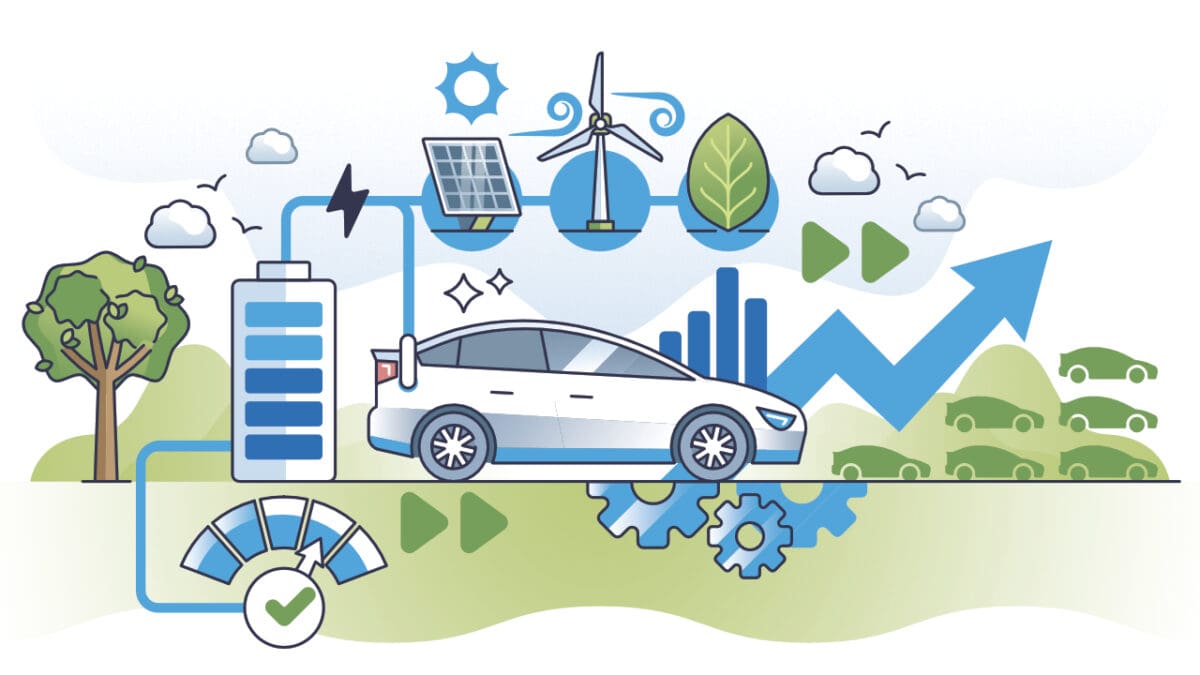
Optimize Your Electric Fleet in 2025
Electric vehicles (EVs) are no longer a futuristic concept—they’re the present and rapidly becoming the backbone of modern fleet operations. As businesses seek to reduce costs, improve efficiency, and align with sustainability goals, EV adoption in fleets is skyrocketing. Global EV sales surged by over 60% in the last year alone, and fleet operators are leading the charge toward a greener future.
While EVs bring undeniable benefits, they also introduce unique challenges. Managing battery health, optimizing charging schedules, and planning routes within limited ranges require specialized tools that traditional fleet management systems can’t provide. This is where EV fleet management software takes the lead.
Designed specifically to address the complexities of electrified fleets, this software streamlines operations by offering real-time insights, predictive maintenance, and intelligent energy management. For businesses navigating the transition to EVs, it’s not just a tool—it’s a game-changer. Today, we’re taking a closer look at how EV fleet management software is shaping the future of fleet operations.
Key Features of EV Fleet Management Software
Efficient fleet management is critical for the seamless operation of electric vehicles (EVs), and EV fleet management software is packed with features to address unique EV challenges. These tools are designed to optimize operations, reduce costs, and improve fleet reliability. Here are the key features that make EV fleet management software indispensable.
1. Real-Time Vehicle Monitoring
A cornerstone of effective fleet management, real-time vehicle monitoring provides continuous visibility into the location and status of every vehicle. With precise location tracking, fleet managers can monitor vehicles in transit, allowing for optimal utilization and quick responses to route deviations or delays. Optimization tools also track key metrics such as mileage and energy consumption, allowing managers to allocate vehicles strategically based on their range, charge levels, and operational requirements. This not only maximizes efficiency but also minimizes unnecessary wear and tear on the fleet.

2. Battery Health and Charging Optimization
Battery health and charging optimization is essential for maintaining fleet reliability and controlling costs. Real-time battery tracking allows fleet managers to monitor charge levels across all vehicles, reducing the risk of unexpected power depletion mid-route. Optimized charging schedules also take advantage of off-peak electricity rates and avoid grid congestion, allowing vehicles to be charged promptly and cost-effectively. This feature guarantees vehicles are always ready to meet operational demands by minimizing downtime and strategically managing energy use.
3. Route Optimization for EVs
Unlike traditional vehicles, EVs present unique challenges that require specialized route planning to address range limitations and charging infrastructure. Advanced planning software creates efficient routes that maximize vehicle range by avoiding high-energy consumption areas, such as steep inclines or heavy traffic. Charging integration also guarantees that routes incorporate stops at charging stations when necessary, allowing vehicles to complete their journeys seamlessly without risking power depletion. This specialized planning keeps operations smooth and uninterrupted.
4. Predictive Maintenance Alerts
Unexpected vehicle malfunctions can lead to costly downtime, but predictive maintenance helps mitigate this risk by using data to anticipate and prevent issues. Sensors and telematics gather real-time information on critical components like battery health and motor performance, providing fleet managers valuable insights. Alerts notify managers of potential problems before they escalate, allowing for proactive repairs and scheduled maintenance. This approach minimizes disruptions, reduces costs, and extends the overall lifespan of the fleet’s vehicles.
5. Energy Cost Management
Electricity costs often fluctuate based on timing and usage patterns, making effective energy expense management crucial for EV fleets. Advanced software enables usage monitoring, allowing fleet managers to analyze energy consumption trends and pinpoint inefficiencies. Cost optimization strategies can then be implemented, like charging vehicles during off-peak hours and balancing energy demand to reduce operational expenses over time. These capabilities keep EV fleets operating well, cost-effective, and without disruptions. By leveraging these tools, businesses can enhance fleet performance and maintain a competitive edge in an increasingly electrified landscape.
Related Reads: Analysis: EV Delivery Fleets vs Conventional Fleets
Benefits of Using EV Fleet Management Software
Adopting EV fleet management software provides significant advantages for businesses, offering solutions that address operational and environmental challenges. From financial savings to regulatory compliance, these benefits underscore the value of integrating advanced software into fleet operations.
1. Cost Savings
One of the most immediate benefits of EV fleet management software is the potential for cost reductions. Unlike traditional vehicles, EVs inherently lower fuel costs by relying on electricity, significantly cheaper than gasoline or diesel. Fleet management software further amplifies these savings by optimizing charging schedules for off-peak electricity rates. EVs also require less maintenance due to fewer moving parts, and software tools enhance this advantage by predicting maintenance needs, preventing costly repairs, and minimizing downtime.
2. Increased Operational Efficiency
Efficiency is critical for fleet managers, and EV fleet management software helps streamline operations through data-driven insights. Real-time monitoring and analytics enable managers to track key performance indicators such as energy consumption, route efficiency, and vehicle utilization. By automating tasks like route planning and charging schedules, businesses save time and better allocate resources. This increased operational efficiency reduces costs and improves overall productivity, keeping fleets running at optimal capacity.
3. Reduced Environmental Impact
Environmental responsibility is a growing priority for businesses, and EVs significantly reduce emissions compared to internal combustion vehicles. Fleet management software furthers this by optimizing vehicle usage and reducing unnecessary energy consumption. Efficient route planning minimizes miles traveled and energy used, further lowering emissions. Software tools also help prolong battery life and reduce waste by confirming timely maintenance and avoiding overcharging, contributing to a more sustainable fleet.
4. Compliance with Regulations
Compliance becomes increasingly important for fleet operators as governments introduce stricter emissions policies and EV incentives. EV fleet management software guarantees businesses stay ahead of evolving regulations by automating compliance tracking and reporting. Features like emissions monitoring, maintenance documentation, and energy usage analysis simplify adherence to fleet-related policies. This proactive approach reduces the risk of fines or operational delays, keeping fleets running smoothly within legal requirements.
By leveraging the benefits of EV fleet management software, businesses can optimize operations, lower costs, reduce their environmental footprint, and stay compliant with regulations. These tools are not just a convenience but a necessity for maintaining competitiveness in the rapidly evolving transportation landscape.

Challenges Addressed by EV Fleet Management Software
The transition to electric vehicles (EVs) brings unique challenges that can impact fleet operations if not appropriately managed. EV fleet management software provides targeted solutions to address these hurdles, guaranteeing a smooth integration of EVs into existing operations while maintaining efficiency and reliability.
1. Managing Range Anxiety
Range anxiety, or the fear of running out of battery before reaching a destination, remains a common concern among fleet managers and drivers. EV fleet management software alleviates this issue through:
- Real-Time Data: Continuous monitoring of battery levels and remaining range makes sure drivers have accurate information at all times.
- Smart Routing: Route optimization tools consider battery capacity, vehicle energy consumption, and available charging stations to create routes that minimize the risk of battery depletion.
- Predictive Charging Alerts: Notifications alert managers and drivers when a vehicle needs charging, allowing proactive schedule adjustments.
By addressing range anxiety, the software enhances driver confidence and guarantees uninterrupted fleet operations.
2. Integrating EVs into Existing Fleets
Many businesses today operate mixed fleets that combine electric vehicles (EVs) and internal combustion engine (ICE) vehicles. While this setup allows flexibility, managing distinct maintenance schedules, fueling requirements, and operational strategies for each vehicle type is challenging. The complexity can lead to inefficiencies if not addressed.
EV fleet management software simplifies this integration by offering centralized monitoring. Managers can track EVs and traditional vehicles with a single platform, streamlining oversight and reducing the administrative burden of juggling multiple systems. This unified visibility allows fleet performance to be optimized across the board.
The software also provides customizable maintenance scheduling, a critical feature for mixed fleets. EVs and ICE vehicles have different servicing needs—EVs may require less frequent maintenance but still need battery and system checks, while ICE vehicles often demand more routine attention. Fleet management tools accommodate these differences, making sure both types of vehicles are maintained appropriately without disrupting operations.
Optimized resource allocation tools also offer insights into which vehicle type suits specific tasks. For example, EVs may be ideal for short, urban routes due to their efficiency and lower costs, while ICE vehicles might handle longer trips requiring fewer charging stops. This level of strategic planning maximizes fleet productivity and guarantees resources are appropriately deployed.
Related Reads: ICE vs Electric: The Ongoing Debate for Last-Mile Delivery Fleets
3. Scaling Up Fleet Electrification
As businesses expand their use of EVs, managing a growing electrified fleet requires careful planning and resource management. EV fleet management software provides insights that make scaling up efficient and cost-effective:
- Infrastructure Planning: Data on charging usage helps identify when and where to expand charging infrastructure to support additional vehicles.
- Utilization Analytics: By analyzing vehicle performance and charging patterns, managers can deploy new EVs efficiently while avoiding overloading existing systems.
- Proactive Cost Management: Software tracks the financial impact of scaling, enabling businesses to optimize investments in vehicles, charging stations, and energy resources.
By addressing these challenges, EV fleet management software empowers businesses to overcome operational barriers, integrate EVs seamlessly, and scale electrification efforts while maintaining high efficiency and reliability. These tools are essential for navigating the complexities of fleet electrification and long-term success.
How to Choose the Right EV Fleet Management Software
Selecting the right EV fleet management software ensures your fleet operates smoothly, efficiently, and securely. With various solutions available, focusing on key factors like scalability, integration, usability, and security will help you make the best decision for your business needs. Here’s what to consider:
1. Scalability and Customization
As EV adoption grows, fleet operations often need to scale rapidly. The ideal software should support your fleet’s expansion, accommodating additional vehicles and users without losing functionality. Scalable software supports seamless growth, whether adding a few vehicles or transitioning to an entirely electrified fleet.
Customization is equally important. Each fleet has unique operational needs, and the ability to tailor features like dashboards, reports, and notifications allows you to align the software with your specific goals. For example, you might prioritize battery analytics or route optimization for long-distance trips—customizable tools let you focus on what matters most.
2. Integration with Existing Systems
Your fleet management software should work effortlessly with your current systems, such as telematics, enterprise resource planning (ERP) platforms, and dispatching tools. Integration guarantees data flows smoothly between systems, reducing manual entry errors and saving time.
Integration is particularly valuable for businesses operating mixed fleets of EVs and internal combustion engine (ICE) vehicles. Unified software can monitor all vehicles on a single platform, simplifying operations and confirming efficiency across the entire fleet.
3. User-Friendly Interface and Support
Adopting new technology can be challenging, especially for teams with varying technical expertise. Look for software with an intuitive interface that requires minimal training. Drivers and managers should be able to navigate the system easily, guaranteeing quick adoption and efficient use.
Reliable customer support is also a critical factor. From initial onboarding to troubleshooting technical issues, having access to responsive support keeps the software a reliable tool for your operations.
4. Data Security and Privacy Considerations
Fleets generate vast amounts of sensitive data, from vehicle locations to driver details, so robust security measures are essential. Choose software that employs advanced encryption protocols and adheres to data privacy regulations. This safeguards your data and builds trust with customers and stakeholders.
Focusing on scalability, integration, usability, and security allows you to select EV fleet management software that supports your current needs and long-term goals. Making an informed choice keeps your fleet efficient, secure, and ready for the future of transportation.
Want more industry insights?
Subscribe to our newsletter to receive weekly last mile logistics insights directly to your email inbox each week!
Driving the Future with EV Fleet Management Software
As the transportation industry moves toward a more sustainable future, effectively managing electric vehicle fleets is no longer optional—it’s essential. The right EV fleet management software empowers businesses to overcome operational challenges, optimize performance, and maximize the benefits of electrification. By streamlining key aspects like route planning, battery optimization, and real-time tracking, these tools help fleets operate efficiently, sustainably, and cost-effectively.
Selecting software that aligns with your fleet’s unique needs—prioritizing scalability, seamless integration, usability, and security—can make all the difference in achieving operational success. With the right solution, businesses can confidently embrace the shift to EVs, reduce environmental impact, and stay ahead in a competitive landscape. By leveraging EV fleet management software, you’re not just managing vehicles—you’re driving innovation and sustainability into the future.
Ready to take your fleet operations to the next level? Discover how Elite EXTRA’s advanced tools can optimize your EV fleet management. Contact us today to learn more!
Sources
https://www.iea.org/reports/global-ev-outlook-2024/trends-in-electric-cars
https://www.fleetnews.co.uk/news/opinion-keeping-the-fleet-moving-with-ev-management-software







